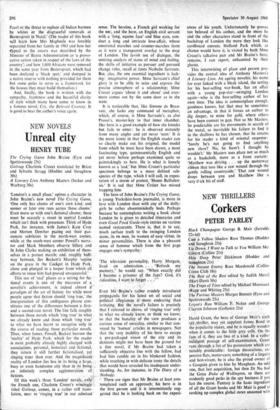Black spot
ROBERT BIRLEY
This is a collection of ephemera, some fifty short pieces written between 1958 and 1967, most of them on contemporary events, for two South African journals with a limited circula- tion, supporting a political party which came into existence only in 1953 and was dissolved a few weeks ago. Some of the articles deal with incidents or people practically unknown in this country. Very few here will have heard of the Charlestown 'black spot,' from which Africans were evicted in 1960, or of the -pro- hibited political meeting at Genadendal in 1964, or of Edith Rheinallt Jones, Peter Brown, Jordan Ngubane or Eliott Mngadi. But this is an important book for several reasons.
First, it is necessary reading for any who wish to understand the development of South African society and politics during the last ten years. It will introduce many to the views and reactions of a group of people in South Africa, numerically small but presumably in- fluential, since they received a remarkable tribute from the government when it 'banned' some forty of them and detained under the ninety-day detention law some thirty more. This picture of events in South Africa, of the laws maintaining apartheid and of the erosion of the rule of law, given by the president of the Liberal party, is one which future historians of South Africa will regard as an essential source.
The book, too, may well come to seem a classic in what is becoming a. major debate, one which is, as it were, an offshoot of the fundamental world debate on the colour ques- tion. It centres on -the dividing line between those who reject violence and believe that per- suasion, example and doing everything possible to help oppressed peoples are still -useful aoti- vides, and those who believe Ibat a violent solution is the only possible one. We in this country are beginning to be aware of this debate. In these articles the issue is hardly argued: it is quietly taken for granted that exposing stupidity and cruelty and upholding a liberal attitude are worthwhile.
The book, in fact, is a defence of liberalism, and the words, liberal and liberalism, are used constantly without a trace of self-conscious- ness. Some may find it refreshing to read an author who is not afraid to do so; some may find the book old-fashioned; some taay agree with the Nationalist party newspaper. D.e Transvaler, that 'liberalism is one of the greatest threats to the survival of the Republic of South Africa.' (The prize for such state- ments must go. however, to Mr Vorster, quoted in Professor Callan's excellent introduction, 'Communism in its essence is anti-national. Because it is anti-national and because the liberals throughout the world reject national- ism. the liberals are wittingly or unwittingly the prime [sic] promoters of Communism.') It is clear, in fact, that the issue of apartheid raises political and moral problems which are not confined to South Africa. Among these are religious questions. On the one hand, there is the view that white South Africa is 'a bastion of Christianity.' or to quote the immortal words of the chief whip of the Nationalist party in a debate in Parliament in 1959, that the cross is 'a mighty anchor for national preservation.' On the other, are such words as these: 'It is almost impossible for any non-Nationalist to find any connection between the teachings of Christ and the expulsion of Mrs Mapheele from
Paarl or the threat to replace all Indian barmen by whites or the 'disgraceful removals at Besterspruit in Natal.' (The reader of this book wjll learn hOvi Mrs Mapheele was forcibly separated -from her family in 1963 and how her trppeal to the courts was described by the Minister' of Bantu Administration as 'a provo- cative action taken in respect of the laws of the country'; and how 1,600 Africans were removed in the same year from Besterspruit, which had been declared a 'black spot,' and dumped in a native reserve with nothing provided for them but some poles to serve as a framework for the houses they must build themselves.)
And, finally; the book is written with the sympathy, frankness and the beautiful clarity of style which many have come to know in a famous novel, Cry, the Beloved Country. It is good-,to hear the author's voice again.



































 Previous page
Previous page